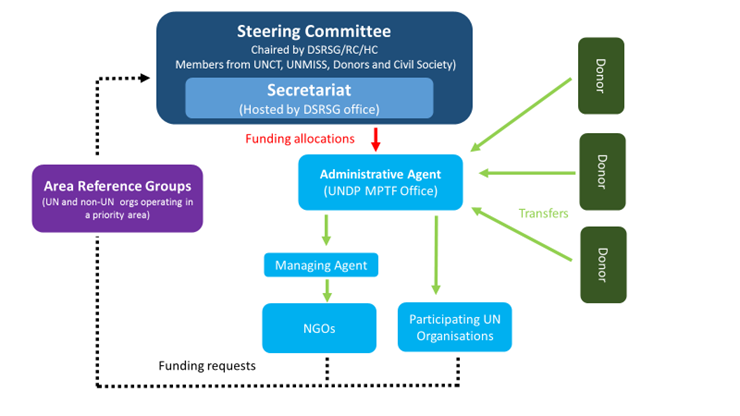GovernanceGovernance arrangements
Steering Committee
Provides strategic guidance and oversight of the Trust Fund. Committee members identify priority areas and review proposals submitted by potential partners. Chaired by the Deputy Special Representative of the Secretary General (DSRSG), Humanitarian Coordinator, and the United Nations Resident Coordinator, the Steering Committee is also comprised of representatives from the UNCT, UNIMISS, donor countries, the Secretariat, and NGOs. The Committee makes decisions by consensus.
Trust Fund Secretariat
Hosted by the Office of the DSRSG, the Secretariat is responsible for the day-to-day operations of the Trust Fund. It provides technical and administrative support to the Steering Committee and follows up on all aspects of Fund resource allocation and project cycles.
Area Reference Groups
Area Reference Groups are comprised of representatives from the United Nations, local authorities and communities, and partnering organizations. They undertake community and stakeholder consultations, assess context specific needs, risks, and capacities, recommend funding priorities, and review and assess fund requests submitted by partners.
Administrative Agent
Funds are routed by way of a pass-through mechanism. Participating Organizations receive funds through the Administrative Agent, the Multi-Partner Trust Fund (MPTF) Office. The Administrative Agent is responsible for the receipt, administration and management of contributions from donors, disbursement of funds to Participating Organizations, and consolidation and dissemination of progress reports to donors.
Managing Agent
UNDP, in its capacity as Managing Agent, ensures that NGOs are able to access the South Sudan RSRTF by providing oversight functions and ensuring that project implementation is in line with Fund rules, regulations, directives and procedures.
Implementing Partners
The Fund acts as a pass-through mechanism, transferring resources directly to Participating United Nations organizations that have signed a memorandum of understanding with the Administrative Agent. Each Participating Organization assumes full programmatic and financial accountability for funds disbursed by the MPTF Office.





